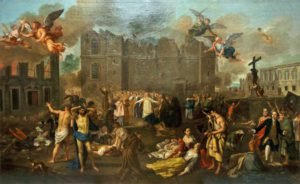Precis: Secular critics of Christianity typically appeal to the infamous trial of Galilee Galileo in Rome (1616) as indisputable evidence that Christianity is an intolerant and intellectually bankrupt system. The secular critics’ story is one of the inexorable retreat of Christianity into the backwaters of social progress, and of its being left behind in the advancement of the knowledge enterprise. Consequently, one would have expected the Christian religion to wither at the margins of society and eventually go the way of the gypsies. But this has not been the case. It calls to mind Mark Twain’s remark, “The report on my death was an exaggeration.” Continue reading “Galileo’s Trial on Trial: From Teleological Science to Mathematical Empirical Science”
Galileo’s Trial on Trial: From Teleological Science to Mathematical Empirical Science
Precis: Secular critics of Christianity typically appeal to the infamous trial of Galilee Galileo in Rome (1616) as indisputable evidence that Christianity is an intolerant and intellectually bankrupt system. The secular critics’ story is one of the inexorable retreat of Christianity into the backwaters of social progress, and of its being left behind in the … Continue reading “Galileo’s Trial on Trial: From Teleological Science to Mathematical Empirical Science”
 The problem of evil is arguably the most intractable problem facing the theist. The first challenge for the theist is the logical problem of evil which says that the set of propositions comprising the following – (1) An omnipotent God creates this world, (2) God is perfectly good, (3) This world is not perfectly good, i.e. evil exists – is an inconsistent set. Holding to any two of these propositions requires dropping the third to avoid the problem of contradiction. For example, that evil exists demands either God is good but not omnipotent (since he fails to prevent evil) or that God is omnipotent but not truly good (since he allows evil despite having the power to prevent it).
The problem of evil is arguably the most intractable problem facing the theist. The first challenge for the theist is the logical problem of evil which says that the set of propositions comprising the following – (1) An omnipotent God creates this world, (2) God is perfectly good, (3) This world is not perfectly good, i.e. evil exists – is an inconsistent set. Holding to any two of these propositions requires dropping the third to avoid the problem of contradiction. For example, that evil exists demands either God is good but not omnipotent (since he fails to prevent evil) or that God is omnipotent but not truly good (since he allows evil despite having the power to prevent it).